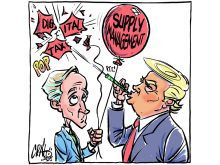IN ITS final week, election 2004 is a horse race. Six months ago, it was supposed to be a Liberal cakewalk, Northern Dancer at the Queen’s Plate with the only question being how big a majority Paul Martin would win.
Would he surpass Brian Mulroney’s 211 seats in 1984? Would he consign the Bloc Québecois to the trash bin of history? Would he make the West into Liberal country again, as it was until 1957?
No, no and no.
What a difference four weeks of campaigning have made. All of the major parties have serious credibility gaps.
Read Also

Agriculture needs to prepare for government spending cuts
As government makes necessary cuts to spending, what can be reduced or restructured in the budgets for agriculture?
The Liberals are in danger of losing government and have all but written off a western breakthrough as Martin tries to win Ontario seats by campaigning against Alberta premier Ralph Klein.
What was that, Mr. Martin? Dealing with western alienation will be the touchstone of your prime ministership? Making an enemy out of the Prairie’s most enduring premier for eastern pay-off is hardly a recipe for western sympathy.
Meanwhile, the Conservatives are in danger of forming government, minority or majority, with no real policy voters can count on.
Since it formed late last year as a shotgun marriage of the Alliance and Progressive Conservative parties, the Conservatives have not had a chance to set policy at a members’ convention.
Anything they promise has been made up by leader Stephen Harper and his coterie of national council advisers.
Will Conservative members in some future policy convention approve the back-of-the-envelope policies the Conservatives have been espousing?
Confusion during the campaign over whether the party would hold a vote among grain farmers before ending the Canadian Wheat Board monopoly illustrates the point.
Agriculture critic Gerry Ritz and a number of prominent prairie candidates said democracy dictates that a farmer vote would be necessary before irrevocable marketing changes are made.
Head office in Ottawa issued a dictum that insisted party policy is for a CWB change without a farmer vote.
The candidates fell into line but which wing will win at a policy convention?
Then there are the New Democrats.
The party seems divided on issues like pesticide use and trade policy, depending on the candidate questioned.
And while leader Jack Layton insists the party supports the gun registry and opposes a federal law requiring Quebec separatists to ask a clear question of Quebec voters before separating from Canada, most NDP MPs in Parliament took the opposite view.
Like the Conservatives, it is tough to really predict what NDP policy will be in the new Parliament.
Liberal policy is clear, if not credible: only Liberals represent Canadian values; Conservatives are un-Canadian scary monsters.
One other part of the Liberal strategy on the Prairies turned out to be not very credible. Candidates were promoting themselves as candidates for the government side.
Shouldn’t westerners finally stop being outsiders and join government?
Midway through the campaign, the Liberal assumption of the right to govern was challenged by falling Liberal polls and rising Conservative support.
Louis St. Laurent’s record as the last Liberal leader to win the West remains intact.
















